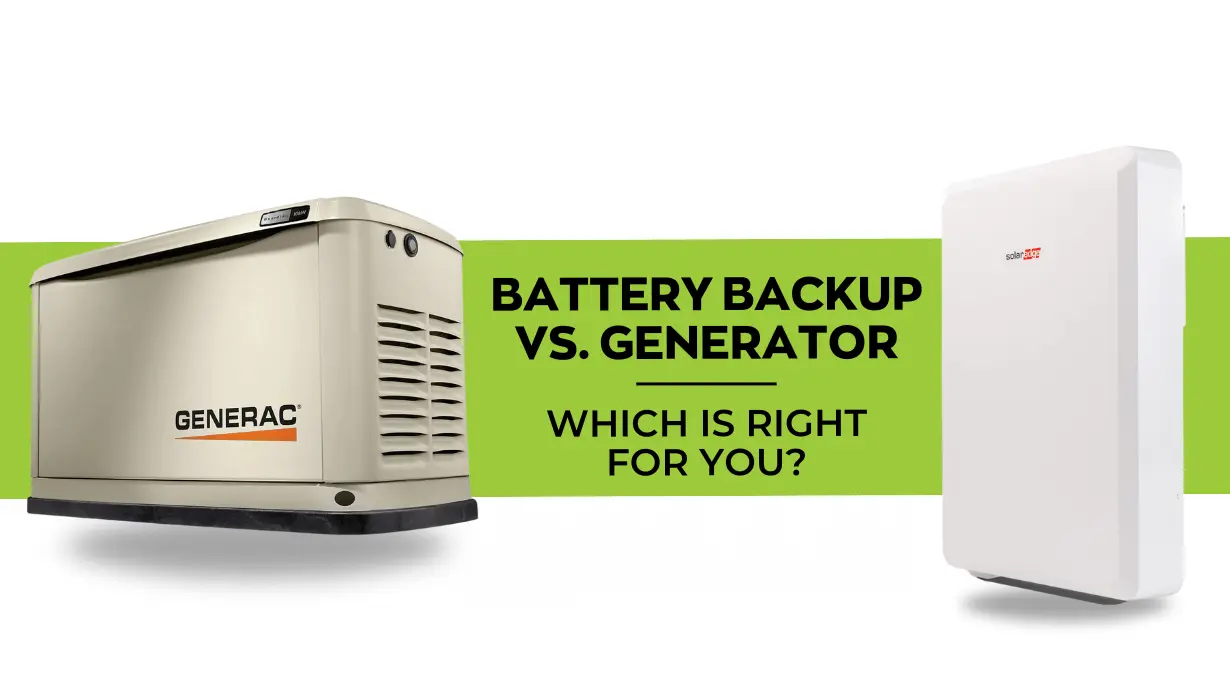Introduction:
In an era where power outages can disrupt our daily lives, having a reliable backup power source is essential. Homeowners often face a choice between home standby generators and battery backup systems. Both options have their advantages and drawbacks, making it crucial to understand which one best suits your needs. In this blog, we will explore the differences between home standby generators and battery backup systems, discuss their pros and cons, and help you decide which solution is better for your home.
Choosing between a generator and a battery for power outages depends on your needs. Generators provide continuous power for longer outages, while batteries are quieter, require less maintenance, and are more environmentally friendly. Assess your power requirements to decide which option is best for you.
Is a Generator Better Than a Battery for a Power Outage?
Power Duration and Output
Home standby generators are often better suited for prolonged power outages. They can supply continuous power for days, provided they have enough fuel. This makes them ideal for areas with frequent or extended outages. In contrast, battery backup systems typically offer limited power duration, often lasting just a few hours, depending on the battery size and the load. For homeowners needing long-term power, a generator might be the better option.
Maintenance and Upkeep
Generators require regular maintenance, including oil changes and fuel management, to ensure they are ready to operate during an outage. They can be noisy and require space for fuel storage. On the other hand, battery backup systems are low maintenance and silent, but their capacity can be limiting in extended outages. For those prioritizing convenience and minimal upkeep, a battery system may be more appealing.
Environmental Impact
Battery backup systems are generally more environmentally friendly than generators. They do not produce emissions and can often be charged using renewable energy sources like solar panels. Generators, particularly those running on fossil fuels, emit greenhouse gases and other pollutants. Homeowners concerned about their environmental footprint may prefer battery backup systems.
What Are the Disadvantages of a Standby Generator?
Fuel Dependency
Standby generators rely on a steady fuel supply, such as propane, natural gas, or diesel. During a prolonged power outage, obtaining fuel might become challenging, especially if supply lines are disrupted. This dependency can be a significant drawback, particularly in areas prone to severe weather events that might cut off fuel access.
Noise and Emissions
One of the most common complaints about standby generators is their noise. They can be loud, which might not be suitable for densely populated neighborhoods. Additionally, they emit exhaust gases, contributing to air pollution. For homeowners concerned about noise and environme ntal impact, these are significant disadvantages.
Cost and Installation
The initial cost of purchasing and installing a standby generator can be high. Installation often requires professional help, including connecting to the home’s electrical system and possibly installing a fuel line. Ongoing maintenance also adds to the overall cost. Compared to battery backup systems, which are typically less expensive to install and maintain, generators represent a more significant investment.
What Is the Difference Between Backup and Standby Generators?
Backup Generators
Backup generators are portable units that can be moved and connected to specific appliances or circuits during a power outage. They are often used as temporary solutions and are manually operated. These generators are usually less expensive and require less installation effort but need to be set up each time there is a power outage.
Standby Generators
Standby generators are permanently installed systems that automatically activate during a power outage. They are connected to the home’s electrical system and can power the entire house or selected circuits. Standby generators are more powerful, convenient, and reliable for long-term use but come with higher costs and more complex installation requirements.
Operational Differences
The key difference lies in how each system is used. Backup generators are ideal for temporary power needs and can be stored away when not in use. Standby generators, however, are designed for continuous, long-term operation during extended power outages. Homeowners should choose based on their specific power needs and the likelihood of prolonged outages in their area.
Which Is Better, UPS or Generator?
Uninterruptible Power Supply (UPS)
A UPS provides immediate power to critical devices during a power outage, preventing interruptions. It’s ideal for protecting sensitive electronics like computers and medical equipment from sudden power loss. However, UPS systems have limited battery life and are designed for short-term use, often just long enough to safely shut down devices or switch to a generator.
Generators
Generators provide sustained power over longer periods, making them suitable for whole-house power during extended outages. While they are not as instantaneous as a UPS, they offer more comprehensive power coverage and can keep the entire home running. The choice between a UPS and a generator depends on the duration and scope of the power backup required.
Combined Use
In some cases, combining a UPS with a generator offers the best of both worlds. The UPS can bridge the gap during the time it takes for the generator to start, ensuring there’s no interruption to critical devices. This setup is particularly useful in homes or businesses where uninterrupted power is crucial.
Short Answers:
- Is a generator better than a battery for a power outage?
Generators are typically better for long power outages, offering continuous power, while batteries are quieter, lower maintenance, and more environmentally friendly for shorter outages. - What are the disadvantages of a standby generator?
Standby generators can be noisy, require regular maintenance, are dependent on fuel supply, and have higher installation costs compared to battery systems. - What is the difference between backup and standby generators?
Backup generators are portable and used temporarily, while standby generators are permanently installed and automatically power your home during an outage. - Which is better, UPS or generator?
A UPS is better for short-term, immediate power needs, while a generator provides long-term power during extended outages. Combining both can offer seamless, uninterrupted power.
Conclusion:
When choosing between home standby generators and battery backup systems, it’s essential to consider factors like power duration, maintenance, environmental impact, and cost. Generators provide continuous power for long outages but require more upkeep, while battery systems offer quieter, eco-friendly alternatives for shorter interruptions. By understanding your specific power needs, you can select the best solution to keep your home running smoothly during an outage.

